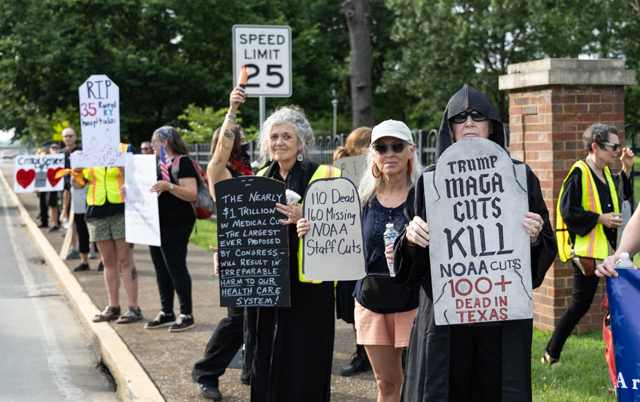Lt. Gov. Coleman promotes administration’s Education First Plan
Published 8:00 am Friday, March 3, 2023

- Lt. Gov. Jacqueline Coleman speaks in support of the Beshear/Coleman Administration’s Education First Plan in the Bowling Green High School Performing Arts Center in Bowling Green, Ky., on Wednesday, March 1, 2023. The Education First Plan, which was announced in October 2022 as a way to ease the student learning loss brought on by the pandemic and a lack of pay raises for teachers, aims to give a 5 percent pay raise for all school staff, provide universal pre-kindergarten, set out a student loan forgiveness plan, restore the pension system and make mental health resources readily available. (Grace Ramey/grace.ramey@bgdailynews.com)
Education has recently been at the forefront of the political conversation in Kentucky in light of a teacher shortage impacting communities across the commonwealth.
As of January 2023, there were approximately 1,500 certified educator vacancies in the state, according to testimony by Kentucky Department of Education Commissioner Jason Glass.
Trending
The turnover rate in the 2021-22 academic year reached 20.4%, compared to a 14-15% national benchmark, he told members of the legislature.
Wednesday, Lt. Gov. Jacqueline Coleman visited Bowling Green High School to share her and Gov. Andy Beshear’s plan to address the teacher shortage and other educational issues facing Kentucky after the pandemic.
Coleman is the first teacher to hold the office of lieutenant governor since Martha Layne Collins in the 1980s. As such, she said the administration’s Education First Plan is personal.
“I’ve walked in the shoes of the educators who wake up every day with one goal: to help kids in their classrooms become better today than they were yesterday,” she said. “Not just better writers or better historians, better humans.”
The Education First Plan, first announced in October 2022, has six tenets:
- a 5% pay raise for all school employees;
- universal pre-K;
- a student loan forgiveness program for public school teachers;
- restoration of the pension system ended in 2021 by the Kentucky legislature;
- restoration of funding for textbooks, instructional materials and professional development;
- support for students’ social and mental health.
Kentucky ranks 44th in teacher pay nationally, Coleman said. In the past seven years, inflation-adjusted pay has dropped by 14.7%, equating to a near-$10,000 salary decrease for the average educator, she said.
Trending
“Teachers should not be victims of circumstance nor should their courage to answer a calling be touted as the reason for paying them less than they deserve,” she said.
Lucas Firkins, Western Kentucky University teacher education major, spoke at the event. He said that the low pay is something every college student who wants to become a teacher has to consider before making career decisions.
“Just from the few interactions I’ve had with students, I’m rewarded through my relationship building with students and the joy that they make me feel to see them learning,” Firkins said “But those relationships don’t put food on the table, nor do they pay to keep the lights on.”
Firkins said that the proposed 5% pay raise is a good “first step” in addressing the shortage.
He also showed his support for the student loan forgiveness program, which would grant up to $3,000 annual loan forgiveness for every year a teacher works in a public school.
Coleman said that the program would attract teachers, increase retention and encourage those who might otherwise be hindered by debt to seek advanced degrees.
Students who attend preschool are 50% more likely to go to college and graduate with a two- or four-year degree, said another speaker, Kaylee Crowder, a local mother and math educator.
“Not only is the student’s ability as they enter kindergarten mathematically an indicator for their success as a high school student in a mathematics classroom, it’s also a great indicator for their literacy skills, their critical thinking skills and also science abilities,” she said.
She said that her 4-year-old son would not be as academically successful without a quality preschool experience, but that it’s unfortunate that not all students have the same privilege.
“Universal pre K is a win win win for our littlest learners, our parents and our economy,” said Coleman, who called today’s classrooms “the future of Kentucky’s economy.”
Even before the pandemic, students’ mental health was declining. According to CDC data, nearly 1 in 5 children had a mental disorder like depression, anxiety or substance abuse, with only 20% of those receiving specialized mental health care.
Pre-pandemic, 15% of Kentucky high school students reported seriously considering suicide.
To address this, Coleman created the student mental health initiative, led by students with help from other stakeholders. The initiative launched 10 regional action summits to get feedback from students and crafted a set of policy recommendations from the meetings.
Butler High School senior Delaney Daughtery was one of the student leaders, and said that teachers and counselors are overburdened, with too much work to do and not enough time to help all the students who need it.
“It’s really sad to see students that are struggling that don’t have a way to get there,” Daughtery said. “So as students, we don’t blame our counselors and teachers. We sympathize with them. We see them struggling. We hope for a bigger budget. We hope for more teachers. We hope for something to help them so they can do the meaningful work they wanted to do in the first place.”
Many elements of the plan will require the support of the General Assembly, which is uncertain, particularly in this year’s non-budget session.
Coleman said that she hasn’t been given any reason to believe that the budget will be opened this year to accomplish any of the Education First goals.
“I’m not sure what the majority is going to have an appetite for,” she said. “… But there’s always time, there’s always a chance and we just keep advocating for it.”
Even if nothing happens this session, Coleman is preparing for the 2024 budget year by getting the message out and reminding people that this is a priority, she said. Coleman said that Kentuckians who share this priority should reach out to their elected officials to advocate for the Education First plan.
“Our legislators are going to have to listen to their constituents and they should,” she said. “So our constituents, their constituents need to be talking about the things that they value and prioritize.”






